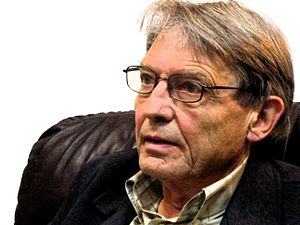Jean-Claude Risset facts for kids
Quick facts for kids
Jean-Claude Risset
|
|
|---|---|

Risset in 2008
|
|
| Born |
Jean-Claude Raoul Olivier Risset
13 March 1938 Le Puy-en-Velay, Rhone-Alpes region, France
|
| Died | November 21, 2016 (aged 78) Marseille, France
|
| Education | École Normale Supérieure, Music theory (1961) |
| Years active | 1961-2011 |
| Employer | Nokia Bell Labs |
| Known for | Computer Music |
Jean-Claude Risset was a French composer. He was born on March 13, 1938, and passed away on November 21, 2016.
Risset is best known for his amazing work in computer music. He was one of the first people to create music using computers. He studied with famous musicians and worked with other pioneers in this new field.
Contents
About Jean-Claude Risset
Jean-Claude Risset was born in a town called Le Puy-en-Velay, in France.
In 1964, he went to a place called Bell Labs in New Jersey, USA. There, he started using a special computer program named MUSIC IV. He used this program to make computer sounds that sounded just like real brass instruments.
Risset recorded trumpets and studied their sounds very closely. He discovered that the different parts of a sound, called 'partials', changed depending on how loud or long the sound was. This helped him understand how to create very realistic sounds using computers.
He also experimented with new ways to make sounds. These included techniques like FM synthesis and waveshaping. These methods are still used today to create many different sounds.
The Risset Scale and Rhythm
Risset created a cool sound trick called the continuous Risset scale. It's also known as the Shepard-Risset glissando. This scale makes it sound like the musical notes are always going up or down, but they never actually get higher or lower! It's a bit like an endless staircase for sound.
He also made a similar trick with rhythm. He created a beat that seems to get faster or slower forever, without ever stopping or speeding up completely.
His Important Work and Awards
From 1975 to 1979, Risset was in charge of the Computer Department at a famous music research center called IRCAM in France.
He composed many pieces of music using computers. One of his famous works is "Duet for one pianist" (1989), which he created at MIT Media Labs.
For all his amazing work in computer music, Jean-Claude Risset received many important awards. These included the first Golden Nica award in 1987 and the Giga-Hertz Grand Prize in 2009. He also received top awards in both music and science from France.
Jean-Claude Risset passed away in Marseille, France, in 2016.
Selected Music Works
Jean-Claude Risset created many different kinds of music. Here are some examples:
Music with Voices
- Dérives (1985): For a choir and recorded sounds.
- Inharmonique (1977): For a singer (soprano) and recorded sounds.
Music for Orchestra
- Escalas (2001): For a large orchestra.
- Mirages (1978): For 16 musicians and recorded sounds.
Music for Small Groups
- Profils (1983): For 7 instruments and recorded sounds.
Music for Solo Instruments
- Trois études en duo (1991): For a pianist using a special computer-connected piano.
- Passages (1982): For flute and recorded sounds.
Music Made Only with Computers
- Invisible Irène (1995)
- Sud (1985)
- Mutations (1969)
See also
 In Spanish: Jean-Claude Risset para niños
In Spanish: Jean-Claude Risset para niños
 | Sharif Bey |
 | Hale Woodruff |
 | Richmond Barthé |
 | Purvis Young |

